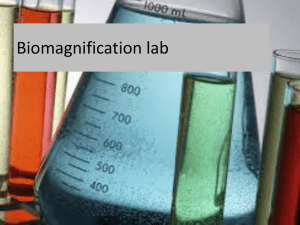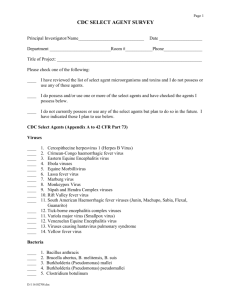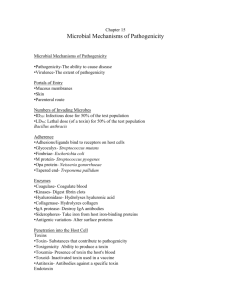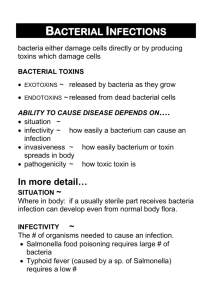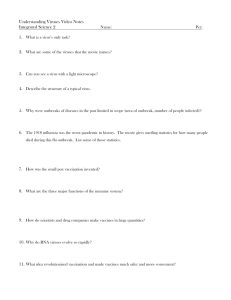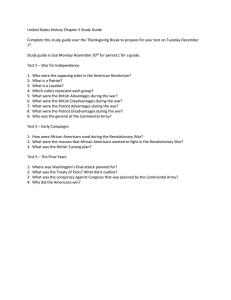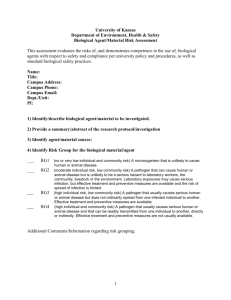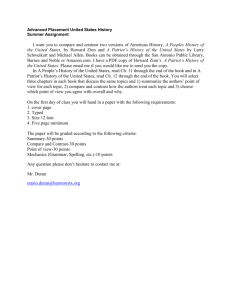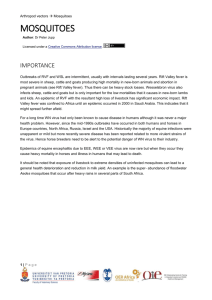Stephen F. Austin State University
advertisement
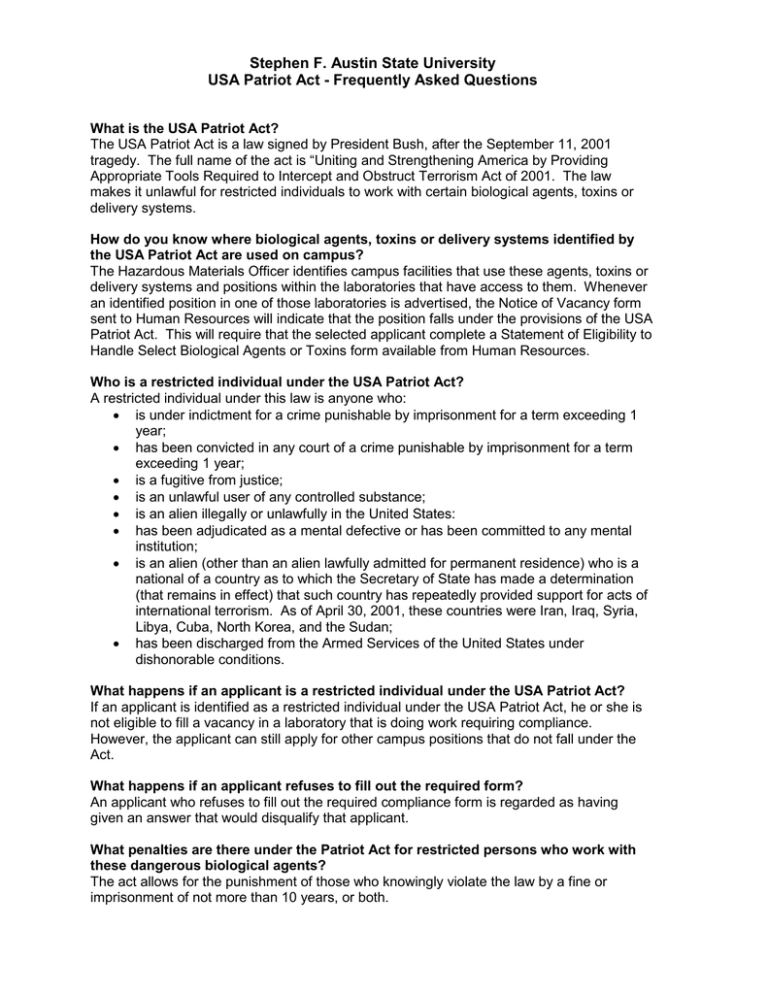
Stephen F. Austin State University USA Patriot Act - Frequently Asked Questions What is the USA Patriot Act? The USA Patriot Act is a law signed by President Bush, after the September 11, 2001 tragedy. The full name of the act is “Uniting and Strengthening America by Providing Appropriate Tools Required to Intercept and Obstruct Terrorism Act of 2001. The law makes it unlawful for restricted individuals to work with certain biological agents, toxins or delivery systems. How do you know where biological agents, toxins or delivery systems identified by the USA Patriot Act are used on campus? The Hazardous Materials Officer identifies campus facilities that use these agents, toxins or delivery systems and positions within the laboratories that have access to them. Whenever an identified position in one of those laboratories is advertised, the Notice of Vacancy form sent to Human Resources will indicate that the position falls under the provisions of the USA Patriot Act. This will require that the selected applicant complete a Statement of Eligibility to Handle Select Biological Agents or Toxins form available from Human Resources. Who is a restricted individual under the USA Patriot Act? A restricted individual under this law is anyone who: • is under indictment for a crime punishable by imprisonment for a term exceeding 1 year; • has been convicted in any court of a crime punishable by imprisonment for a term exceeding 1 year; • is a fugitive from justice; • is an unlawful user of any controlled substance; • is an alien illegally or unlawfully in the United States: • has been adjudicated as a mental defective or has been committed to any mental institution; • is an alien (other than an alien lawfully admitted for permanent residence) who is a national of a country as to which the Secretary of State has made a determination (that remains in effect) that such country has repeatedly provided support for acts of international terrorism. As of April 30, 2001, these countries were Iran, Iraq, Syria, Libya, Cuba, North Korea, and the Sudan; • has been discharged from the Armed Services of the United States under dishonorable conditions. What happens if an applicant is a restricted individual under the USA Patriot Act? If an applicant is identified as a restricted individual under the USA Patriot Act, he or she is not eligible to fill a vacancy in a laboratory that is doing work requiring compliance. However, the applicant can still apply for other campus positions that do not fall under the Act. What happens if an applicant refuses to fill out the required form? An applicant who refuses to fill out the required compliance form is regarded as having given an answer that would disqualify that applicant. What penalties are there under the Patriot Act for restricted persons who work with these dangerous biological agents? The act allows for the punishment of those who knowingly violate the law by a fine or imprisonment of not more than 10 years, or both. What is different now? First, it is now unlawful for an individual to possess certain biological agents, toxins, or delivery systems in a quantity or of a type that “is not reasonably justified by a prophylactic, protective, bona fide research, or other peaceful purpose.” Second, persons who meet the definition of "restricted person" are prohibited from having access to or possessing any amount of the biological agents, or any of the toxins listed on the CDC's list of Select Agents. Persons found guilty of violating this law may be punished by a fine and/or imprisonment for not more than ten years. What Biological Agents does the Patriot Act cover? The term “biological agent" is defined by the Act as any micro-organism, virus, infectious substance, or biological product that may be engineered as a result of biotechnology, or any naturally occurring or bioengineered component of any such microorganism, virus, infectious substance, or biological product, capable of causing death, disease, or other biological malfunction in a human, an animal, a plant, or another living organism; deterioration of food, water, equipment, supplies, or material of any kind; or deleterious alteration of the environment. The term "biological agent" does not encompass any biological agent that is in its naturally occurring environment, if the biological agent has not been cultivated, collected, or otherwise extracted from its natural source. What Toxins are covered by the Act? Under the Act, a “toxin” means the toxic material of plants, animals, microorganisms, viruses, fungi, or infectious substances, or a recombinant molecule, whatever its origin or method of production, including any poisonous substance or biological product that may be engineered as a result of biotechnology produced by a living organism; or any poisonous isomer or biological product, homolog, or derivative of such a substance. The term "toxin" does not encompass any toxin that is in its naturally occurring environment, if the toxin has not been cultivated, collected, or otherwise extracted from its natural source. How Much of A Biological Agent or Toxin May I Possess? Under the Patriot Act, an individual cannot knowingly possess any biological agent or toxin in a quantity that, under the circumstances, is not reasonably justified by a prophylactic, protective, bona fide research, or other peaceful purpose. No definitive quantities or amounts are listed in the law, and the standard will likely be what a reasonable person with knowledge in the affected scientific field would consider to be justified. What is a Delivery System? A “delivery system” under the Patriot Act is any apparatus, equipment, device, or means of delivery specifically designed to deliver or disseminate a biological agent, toxin, or vector. The term "vector" means a living organism, or molecule, including a recombinant molecule, or biological product that may be engineered as a result of biotechnology, capable of carrying a biological agent or toxin to a host. Which Delivery Systems are prohibited? Under the Patriot Act, an individual cannot knowingly possess any delivery system of a type that, under the circumstances, is not reasonably justified by a prophylactic, protective, bona fide research, or other peaceful purpose. What Are the 'Select Agents'? As of December 17, 2001, the Center for Disease Control (CDC) has determined approximately 40 viruses, bacteria, rickettsia, fungi, and toxins to be select agents (see next page): 2 This list is also available online: go to the CDC regulations. Viruses 1. Crimean-Congo Haemorrhagic fever virus 2. Eastern Equine Encephalitis virus 3. Ebola viruses 4. Equine Morbillivirus 5. Lassa fever virus 6. Marburg virus 7. Rift Valley fever virus 8. South American Haemorrhagic fever viruses (Junin, Machupo, Sabia, Flexal, Guanarito) 9. Tick-borne encephalitis complex viruses 10. Variola major virus(Smallpox virus) 11. Venezuelan Equine Encephalitus virus 12. Viruses causing hantavirus pulmonary syndrome 13. Yellow fever virus Exemptions: Vaccine strains of viral agents (Juinn Virus strain candid #1, Rift Valley fever virus strain MP-12, Venezuelan Equine encephalitis virus strain TC-83, Yellow fever virus strain 17-D) are exempt. Bacteria 1. Bacillus anthracis 2. Brucella abortus, B., melitensis, B. suis 3. Burkholderia (Pseudomonas) mallei 4. Burkholderia (Pseudomonas) pseudomallci 5. Clostridium Botulinum 6. Francisella tularensis 7. Yersinia pestis Rickettsiae 1. Coxiella burnetii 2. Rickettsia prowazekii 3. Rickettsia rickettsii Fungi 1. Coccidioides immitis Exemptions: vaccine strains as described in Title 9 CFR, Part 78.1 are exempt. Toxins 1. 2. 3. 4. Abrin Aflatoxins Botulinum toxins Clostridium perfringens epsilon toxin 5. Conotoxins 6. Diacetoxyscirpenol 7. Ricin 8. Saxitoxin 9. Shigatoxin 10. Staphylococcal enterotoxins 11. Tetrodotoxin 12. T-2 toxin Exemptions: Toxins for medical use, inactivated for use as vaccines, or toxin preparations for biomedical research use at an LD sub50 for vertebrates of more than 100 nanograms per kilogram body weight are exempt. National standard toxins required for biologic potency testing as described in 9 CFR Part 113 are exempt. Recombinant Organism/Molecules 1. Genetically modified microorganisms or genetic elements from organisms shown to produce or encode for a factor associated with a disease. 2. Genetically modified microorganism or genetic elements that contain nucleic acid sequences coding for any of the toxins listed or their toxic subunits. Are there any exemptions? The Act specifically exempts any biological agent or toxin that is in its naturally occurring environment, if the biological agent or toxin has not been cultivated, collected, or otherwise extracted from its natural source. There is also an exemption for agents that are part of a clinical specimen intended for diagnostic, reference, or verification purposes. Agents that 3 are toxins having an LD sub50 for vertebrates of more than 100 nanograms per kilogram of body weight which is used for legitimate medical purposes or biomedical research or is one of the above listed toxins which has been inactivated for use as a vaccine or otherwise detoxified for use in biomedical research procedures are exempt as well. Because biological agents and toxins may possibly be added or removed in the future from the CDC’s list, we recommend that researchers consult the list from time to time to insure compliance. What if I have one or more of the select agents in my lab or other work area? You should already have a rule or procedure in place for reporting and securing agents such as these because of their potentially hazardous nature. Be sure you have complied with those requirements. If you are unsure of whether or not you possess a quantity that “is not reasonably justified by a prophylactic, protective, bona fide research, or other peaceful purposes" you may wish to consult your supervisor. Because the Act carries criminal sanctions, you may need to first consult with your personal attorney for counsel. What if I am a "restricted person" and have access to a "restricted agent?" As was stated above, the possibility of criminal sanctions does exist, so you may wish to consult with private counsel before you reveal such information. What do I do if I think one of my graduate students or employees is a restricted person? First of all, don't overreact! Merely being from one of the nations listed in the statute does not automatically make a person a threat to others, and unprofessional conduct or communications can result in substantial harm to reputations and careers of innocent persons. If you have a reasonable belief that someone having access to restricted agents is a restricted person, you should report your concerns to your supervisor. Each case should be reviewed on its own, taking into consideration the facts and circumstances of the person or persons involved. In some cases, research or other work may be restructured so as to allow the restricted person to continue to perform but without access to the restricted agent. In other cases, this may not be feasible and other solutions will be needed. Does this mean I have to ask my students and employees if any of the "restricted persons" criteria apply to them? No. The law does not create an affirmative duty on any individual's part to seek out such information from current employees or students. Procedures for performing necessary background checks may be implemented by each system component as needed for new hires/graduate students, and persons who already have access to restricted agents may be asked to sign a statement attesting to their status under the law. Does this affect the way student records are handled? The new law affected certain parts of the Family Educational Rights and Privacy Act. For information, see U.S. Department of Education’s web-site. 4
